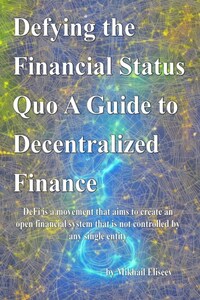Part 1. "Introduction to DEFY: The Future of Financial Services"
Introduction to DEFY: The Future of Financial Services
Financial services have come a long way since the days of bartering for goods and services. From the invention of currency to the development of modern banking and investment systems, the way we manage our money and assets has evolved significantly.
However, the financial industry is not immune to disruption. In recent years, we have seen the rise of fintech companies that are challenging the traditional financial system with innovative technologies and business models.
DEFY is at the forefront of this disruption. A pioneer in the field of decentralized finance (DeFi), DEFY is building a new financial ecosystem that is open, transparent, and accessible to all. In this book, we will explore the vision and mission of DEFY, the principles that guide its development, and the potential impact it could have on the future of financial services.
But before we dive into the specifics of DEFY, let's first take a step back and examine the current state of the financial industry.
The Traditional Financial System
For centuries, the financial industry has been controlled by a small group of institutions, such as banks, investment firms, and insurance companies. These institutions have played a crucial role in facilitating the flow of money and providing financial services to individuals and businesses.
However, the traditional financial system has its fair share of flaws. One of the biggest criticisms is that it is highly centralized, with a few large players dominating the market. This can lead to a lack of competition and a lack of choice for consumers.
Another issue is that traditional financial institutions are often opaque in their operations. It can be difficult for consumers to understand how their money is being used and what fees they are paying. This lack of transparency can breed mistrust and lead to abuses of power.
Finally, the traditional financial system can be exclusionary. Not everyone has access to the same financial products and services, and those who do may have to jump through hoops to qualify. This can create barriers for certain groups, such as low-income individuals or those without a credit history.





